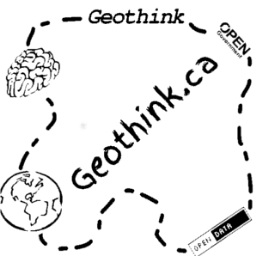Recently I’ve been fortunate enough to be part of a team that has been awarded a SSHRC Partnership Grant for a 5-year study of “How the Geospatial Web 2.0 is reshaping government-citizen interactions”, also called Geothink. This is an unparalleled opportunity to make a long-term impact on emerging research themes of open data, citizen digital participation, and to trace the changing nature of geospatial data creation and use. A description from the grant application:
“Major technology firms like Google, Microsoft and Apple are competing for dominance in web and mobile mapping. These new technologies represent not only a multi-billion dollar industry but a revolution in mapping. Firms build platforms like Google Maps and Bing Maps; individuals “mash” them up on the web or in location-based applications (apps). People contribute the data; they tweet street conditions; their mobile apps deliver directions to the nearest coffee shop, whose reviews also were contributed by individuals. Governments add to the data stream by increasing accessibility of their data, like realtime transportation information. These new forms of map making, called the Geospatial Web 2.0 (Geoweb), are important for Canada, known as a world leader in map making and geographic technologies but whose leadership has since waned.

Our research untangles the hype of the Geoweb. The hype is that the Geoweb increases government efficiency and transparency because more data is online and because non-experts provide data formerly the domain of government. New apps promise to improve citizen participation in a global conversation about where they live and even rewire power relationships. Behind the hype a rapidly evolving Geoweb might rework concepts of individual privacy and collective community. A lack of funding or staff can prevent Geoweb adoption by government; status quo approaches and complex legislation can block efforts to improve government data sharing and may close channels for direct citizen input. Most governments struggle to open their data for sharing or find it difficult to measure the accuracy or authenticity of crowdsourced data. Web 2.0 can reduce respect for experts and increase a tendency for people to be “alone together”, interacting exclusively online.”